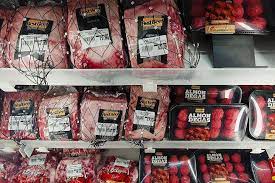Brasília (AFP): Brazil, the world’s biggest beef producer, suspended exports to China Thursday after detecting a case of mad cow disease, though experts believe it is the less-dangerous “atypical” variant, said Agriculture Minister Carlos Favaro.
Exports to China, Brazil’s biggest beef customer, are automatically suspended under a deal between the two countries if regulators detect the disease, known as bovine spongiform encephalopathy (BSE). Brazil’s agriculture ministry said in a statement the case had been identified in a nine-year-old male animal on a small farm in the northern state of Para.
Samples have been sent to the World Organisation for Animal Health (OIE) in Canada for testing, it said. BSE is linked to the fatal human condition Creutzfeldt-Jakob disease if contaminated meat is eaten.
The atypical variant sporadically occurs in older cattle, while the classic form is spread when farmers feed their herds with the meat and bone meal of infected animals. The classic form poses more danger to humans.
Favaro said the farm in question raised grass-fed cattle, making it likely the case was atypical. “Given the characteristics, the past experience of our monitoring system… and the way these animals were raised, it’s very highly probable this case is atypical, caused by aging,” he told CBN radio.
“But we are fulfilling all health protocols to reassure the market and consumers,” he added. “Brazil’s system is reliable and safe.” Favaro said the farm in question had been quarantined and the animal slaughtered and incinerated. Brazil exported 2.3 million tonnes of beef last year, worth a total of $13.1 billion, according to industry group Abrafrigo.
More than half of that went to China. Chinese sales embargoes have hurt Brazil’s beef industry in the past. In 2021, a three-month suspension over two cases of atypical BSE sent share prices in Brazil’s top meat processing companies plunging.







